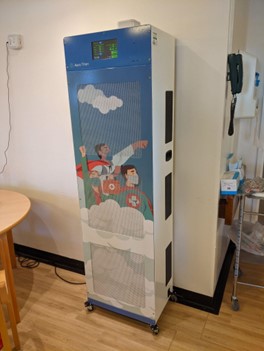New evidence about whether Air Cleaning Units reduce hospital-acquired infections
Cambridge researchers have been looking at whether Air Cleaning Units in hospital wards reduce hospital-acquired infections, particularly COVID-19.

Previous research conducted at Cambridge University Hospitals had demonstrated Air Cleaning Units can remove the virus causing COVID-19 from the air, but it was unknown whether this would lead to a reduction in hospital-acquired infections.
In a newly published study in the Journal of Hospital Infection, supported by the NIHR Cambridge BRC, found the number of hospital-acquired infections were recorded on four wards in the Department of Medicine for the Elderly at Addenbrooke’s Hospital in Cambridge.
In two of the wards, study Air Cleaning Units were installed, while the other two wards continued with usual practice. The researchers compared the number of hospital-acquired infections in both pairs of wards to find out whether or not fewer hospital-acquired infections occurred when Air Cleaning Units were present.
The researchers from the Department of Medicine at Cambridge University Hospitals and and the MRC Biostatistics Unit (BSU), found that having Air Cleaning Units in place was associated with a 22% lower risk of hospital-acquired COVID-19 virus infection, during a hospital stay of typical duration. This suggests Air Cleaning Units may reduce infections to a clinically-meaningfully degree. However, a larger study would be needed to confirm results as there was large uncertainty in this finding: the current results do not rule out Air Cleaning Units having no impact or even increasing the risk.
Researchers found the Air Cleaning Units were initially well received. However, Units were increasingly not operational during the second intervention ward near the end of the study, in Summer 2022. This may have contributed to study results being less certain than expected and most likely occurred because the Units were switched off, perhaps due to noise. The study’s survey of staff and patients found that noise from the Air Cleaning Units was moderately disturbing on the second intervention ward. The survey also found that the majority of survey respondents did not associate the Air Cleaning Units with infection prevention and control and the survey helped us understand how we might be able to better implement this technology in the future.
Dr Victoria Keevil, Consultant Geriatrician at Cambridge University Hospitals and Senior Research Associate in the Clinical School’s Department of Medicine, who led the study and said: “Although challenging, it was important to evaluate this technology in a real-world setting and include the experiences of staff and patients. Many new treatments and technologies do not achieve their potential to improve patient care, even if efficacy is proven, because not enough research considers whether they can be easily adopted into everyday clinical practice.
It is also important to highlight that this study was supported by a research team with diverse skills. Working together was key to making the best use of the available resources enabling this research.”
Research paper:
Brock et al. Efficacy of Air Cleaning Units for preventing SARS-CoV-2 and other hospital-acquired infections on medicine for older people wards: A quasi-experimental controlled before-and- after study. Journal of Hospital Infection. https://doi.org/10.1016/j.jhin.2024.09.017



